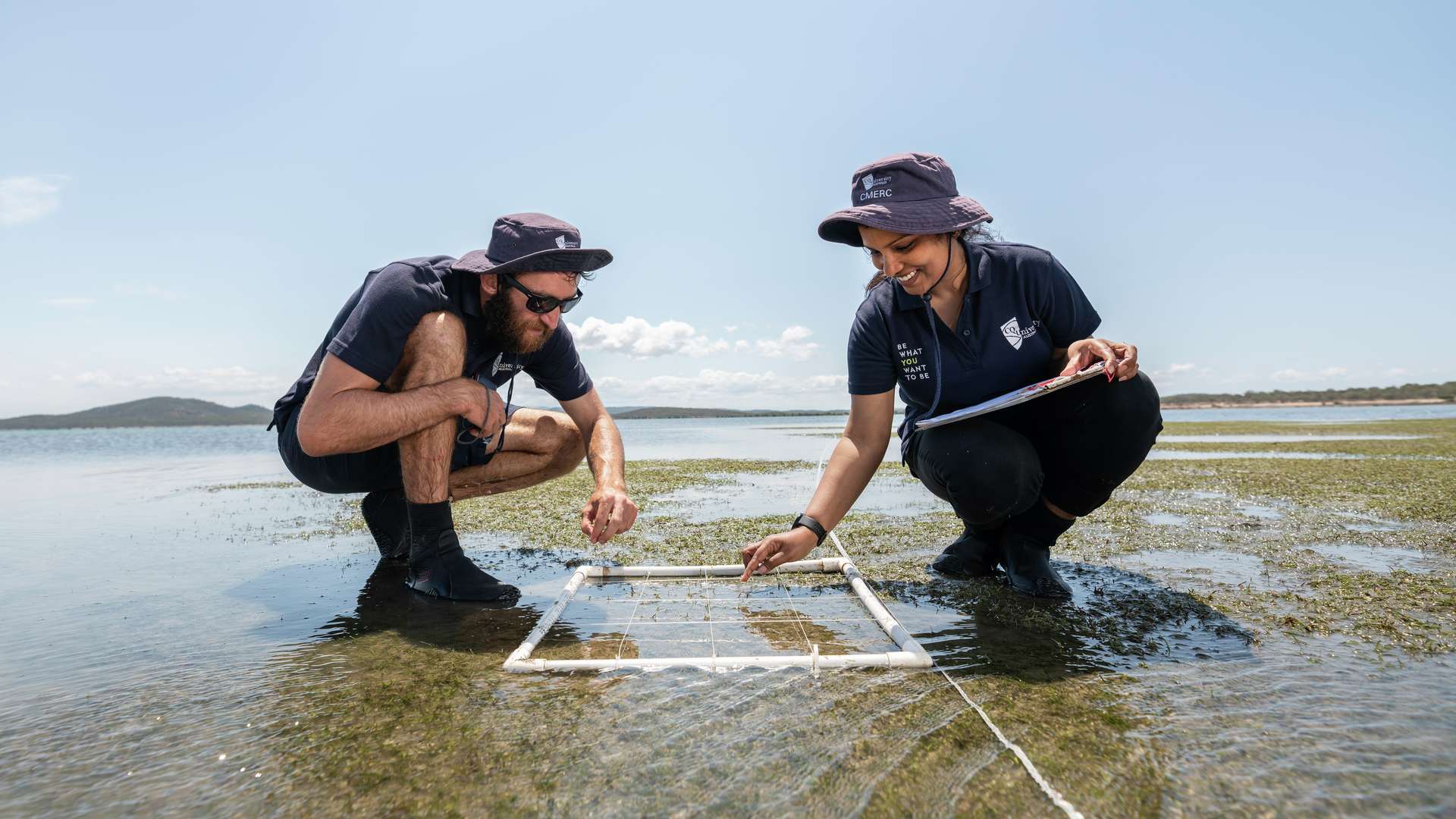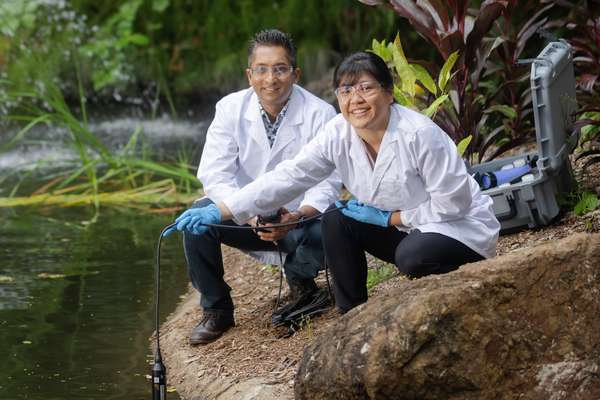Bachelor of Science (Honours) Project Opportunities

As a Bachelor of Science (Honours) student, you'll complete an honours research project that allows you to deeply explore an area that interests you. You can bring your own research idea or explore one of the potential honours projects listed on this page and the respective supervisors available.
We're here to help match you with a suitable project and supervisor, so if you have a specific project in mind or would like to learn more about honours project options, get in touch with our Science Honours team via the links on this page.
Honours Project Opportunities for 2025
Explore the honours projects available within our Bachelor of Science (Honours). You can also propose another honours project idea if the opportunities listed below don't align with your interests and goals.
To secure a supervisor and a potential project, contact the Head of Course to learn more about the course structure, supervision details, and the scope of available projects.
Sediment-dissolved inorganic nitrogen association in the Burnett-Mary catchment of the Great Barrier Reef
This is a data-modelling project in which sediment will be examined as a driver of dissolved inorganic nitrogen within the Burnett-Mary Catchment of the Southern Great Barrier Reef. DIN remains one of the major pollutants in the Great Barrier Reef inshore area and assessing pathways that cause its mobility remains one of the less understood areas within the catchment. Data will be available from the Office of the Great Barrier Reef. The applicant must have a Bachelor of Science or data science expertise
Acceptability of shock wave therapy within a chiropractic students health clinic: A qualitative study.
This project looks to bridge innovation and education. There is an opportunity to explore how final-year chiropractic students engage with medical technology, specifically extracorporeal shockwave therapy (ESWT)—a cutting-edge, non-invasive treatment for musculoskeletal disorders.
Despite its clinical popularity, medical devices like ESWT are often excluded from formal curriculums - primarily taught through postgraduate continuing education. However, CQU, through the Discipline of Chiropractic, has secured a donated device for student use. The proposed qualitative study would use semi-structured interviews to gain insight into final-year students’ willingness to engage with ESWT in the CQU Health (outpatient) clinic in Indooroopilly. A target of 12 students will be sought – with data saturation typically reached at around 12 participants.
Potential outcomes include:
- bridging the academic training/clinical practice gap,
- shaping future curriculum development, and
- provide insights on how to prepare students for real-world clinical innovations.
Freshwater mussels
Little is known about these cryptic creatures in the freshwater rivers of Queensland. Honours projects may involve field and laboratory research, including population and taxonomic assessments, behavioural studies, developing sampling methodology, genetic structure analysis, health and reproductive assessments, heavy metal contamination, bioremediation potential, aquaculture cultivation and rearing, use in environmental restoration, and potential to bioaccumulate and remove contaminants (e.g. microplastics).
Water quality assessment in Gladstone Harbour
Drawing on the long-term data set accumulated by the Port Curtis Integrated Monitoring Program (PCIMP), honours projects in this space may include an in-depth historical analysis of one or several water quality parameters (including heavy metals and nutrients), assessment of correlations among sampled parameters, relationship between weather events (e.g. rainfall and floods) and water quality issues, spatiotemporal analyses of long-term changes etc.
Microplastics
Recent studies have demonstrated a strong association of microplastics with freshwater aquatic plants in central QLD, which have a strong potential to contaminate the ecosystem and move up the food chain. Honours projects in this space may include the assessment of microplastic loads within waterways, detection of sources of contamination, mapping the fate of microplastics in waterways, assessing the potential of microplastics to enter the food web and their resulting toxicity, assessing the potential for eco-friendly bioremediation and removal of microplastics, and methods development.
Fitzroy Basin Environment and River Health (FPRH)
CQUniversity's relationship with the Fitzroy Partnership for River Health (FPRH) creates opportunities for research projects ranging from water quality in the region, plant and animal abundance and distribution, human use and valuation of the ecosystem, as well as industrial development and policy frameworks to ensure sustainability. There is a broad scope of potential projects to do in partnership with the FPRH, with their annual Heart of the Basin Student Scholarship now being increased to $10,000. This is an excellent option if you are looking more toward an environmental management type of research project.
User perceptions of health metrics from wearable devices affecting health behaviours
Wearable health tracking devices provide users full autonomy over how they interpret and apply data. This autonomy can lead to both positive and negative, perceived or real health outcomes. While many achieve improved health, there is emerging evidence that in some individuals, negative outcomes occur. These include compensatory behaviours, anxiety, and reduced activity – which should not be ignored. To ensure that users can better improve their health, we first need to understand how they perceive and interact with their wearable devices to make decisions about their health behaviours.
This study aims to understand the wearable device population, their device interactions, device perceptions, and the perceived impacts on their health outcomes. The project will use qualitative and quantitative survey methods.
Public Health
Co-design is a common method for conducting participatory research in public health, which involves collaborative design using generative research (learning from target group) and creating solutions via co-production. Co-design and co-production methods have recently become commonly used in research in the physical activity and health promotion field. While these approaches have gained popularity, the use of human-centred design thinking (HCDT) as an approach to co-designing and co-producing with communities is uncommon in health research, especially in the area of physical activity.
HCDT is a creative process of solving complex problems and generating meaningful solutions by working through iterative stages of Inspiration, Ideation and Implementation, and it incorporates specific activities rooted in empathising with and understanding the context of end-users to develop innovative interventions. Such participatory approaches and iterative design are best practices for understanding stakeholders’ preferences and needs and are, therefore, appropriate for the present project.
The aim of this project is to synthesise the current understanding of where and how HCDT is being used to guide physical activity research and practice to better understand how HCDT is being applied in the field. This project will entail conducting a scoping review of academic literature on this topic.
Cross-cultural lie detection methods
Beliefs about the efficacy of lie detection methods and the likely behaviour of liars can influence decisions made in forensic contexts. Research shows that the public and law enforcers alike often assume that specific nonverbal behaviours, such as gaze aversion and nervousness, accompany lying. Therefore, to uncover a lie, one should look for these behaviours. However, research also shows that using nonverbal behaviour to detect deception is a fallible method that can and has contributed to incorrect incarcerations.
Many studies outside of Australia have been performed investigating how people detect deception, and it seems most people think that people cannot maintain eye contact when lying. However, little research has been performed with Australian participants. Australia is a multi-cultural country with many citizens from differing cultural backgrounds who may have different views on the meaning of specific nonverbal behaviours. For example, it has been stated that people from primarily collectivist cultures (e.g., people from Japan and First Nations People) may consider gaze aversion as a sign of respect or deference. If Australians from different cultural backgrounds hold different beliefs about the meaning of some nonverbal behaviours (such as gaze), this could lead to misunderstandings in forensic situations.
It seems essential to gauge beliefs about the expected behaviours of one who is lying from Australians of different cultural backgrounds, as this could be pertinent for cross-cultural lie detection in this country (e.g., jury decisions and police interviews). Potential projects could involve surveying or interviewing Australians of different cultural backgrounds or one particular cultural cohort to assess their beliefs about how to detect lies.
Aims of the Project: Assess potential similarities and differences with lie detection methods used by Australians of different cultural backgrounds. Students from diverse cultural backgrounds are encouraged to apply.
Learn More About the Bachelor of Science (Honours)
If you are passionate about scientific research and eager to make impactful contributions to your chosen field the Bachelor of Science (Honours) is the ideal course for you.
Our Research Team
Our expert research supervisors excel in various fields and lead research activities that address national priorities crucial for social, environmental, and economic well-being locally and globally.
Confirm Your Research Project and Supervisor
Before applying for the Bachelor of Science (Honours), reach out to the Head of Course to secure a supervisor and a potential project.



